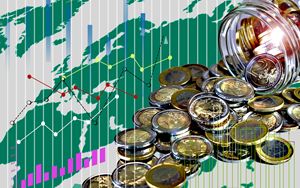(Finance) – In the last two years 722 among the most big businesses of the world have achieved, on average, almost 1,000 billion dollars Of extra profits per year, while the prices of consumer goods, food and energy skyrocketed along with interest rates, with a devastating impact on the cost of living for billions of people around the world. This is revealed by a new analysis by oxfam And ActionAidwhich reviewed the companies in the Forbes “Global 2000” ranking, assessing the extra profits made in 2021-22.
Considering the data for the specific sectors of the economy, the analysis reveals that 45 energy companies made, on average, $237 billion a year in excess profits between 2021-2022. Well, if governments had taxed 90% of the excess profits made by fossil fuel operators and passed on to wealthy shareholders, they would have had enough resources to increase profits by 31%. investments global in energy produced from renewable sources.
Today, on the contrary, there are in the world 96 billionaires who have built their fortunes on fossil fuels and can boast a total assets of almost 432 billion dollars (50 billion more than in April last year). Even the multinationals In the food sector, banks, major pharmaceutical companies and major retailers have seen their positions improve during the inflation crisis, which has driven 250 million people in 58 countries to starvation.
In the field food and beverage 18 giants made, on average in the two-year period 2021-2022, over 14 billion dollars a year in extra profits. A figure equivalent to more than twice the funding gap of 6.4 billion dollars essential to face the terrible food crisis which in East Africa – between Ethiopia, Kenya, Somalia and South Sudan – risks causing 1 in 28 people to die of hunger seconds in the coming months, also in the face of the drastic increase of over 14% in the prices of food products globally in 2022. compartment pharmaceutical 28 large companies totaled $47 billion a year in excess profits, while 42 large retailers and supermarket chains reported excess profits of $28 billion a year, on average in 2021-2022.
Nine of the largest companies in the sector aerospace and of defence they’ve made $8 billion a year in excess profits on average over the past two years, while 9,000 people die of hunger every day, largely as a result of conflict and war.
The “profit problem” is emerging strongly in the present inflation crisisespecially in the European context. According to the International Monetary Fund, the increase in profits explains 45% of the increase in prices in Europe in 2022. Authoritative institutional figures, such as the President of the ECBChristine Lagarde, even went so far as to fear the risk of a greedflation or “inflation from greed”. A term that refers to the attempt by some companies to opportunistically take advantage of inflation, raising prices well beyond the costs of production without surprising consumers given the general inflation.
“Whether it’s greed or not, the bottom line is that companies have still managed to fully pass the increase in costs onto prices. – he said Mikhail Maslennikov, policy advisor on tax justice and the fight against inequalities of Oxfam Italia – If in aggregate the profitability of companies is also proving to be constant, showing incredible resilience, the largest companies, in many sectors, benefit from situations of monopoly and the increased demand, they’ve seen a sizable increase in margins. It is undeniable that profits are today the real winners in the distribution conflict, while wages – which change less quickly than prices, reflecting the delays in renewals and the contractual weakness of workers – are among the losers. The outcome is deeply unfair with only one category, the workers, left to bear the brunt of the high price crisis. – And it is also profoundly inefficient, given that wages fuel the demand for goods and services of the companies themselves”.
